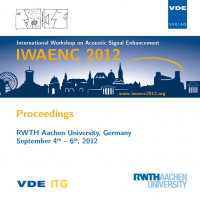Performance Comparison of Algorithms for Blind Reverberation Time Estimation from Speech
Conference: IWAENC 2012 - International Workshop on Acoustic Signal Enhancement
09/04/2012 - 09/06/2012 at Aachen, Germany
Proceedings: IWAENC 2012
Pages: 4Language: englishTyp: PDF
Personal VDE Members are entitled to a 10% discount on this title
Authors:
Gaubitch, N. D.; Naylor, P. A.; Brookes, M. (Centre for Law Enforcement Audio Research (CLEAR), Imperial College London, UK)
Löllmann, H. W.; Jeub, M.; Vary, P. (Institute of Comm. Systems and Data Proc., RWTH Aachen University, Germany)
Falk, T. H. (Institute National de la Recherche Scientifique, Montreal, Canada)
Abstract:
The reverberation time, T60, is one of the key parameters used to quantify room acoustics. It can provide information about the quality and intelligibility of speech recorded in a reverberant environment, and it can be used to increase robustness to reverberation of speech processing algorithms. T60 can be determined directly from a measurement of the acoustic impulse response, but in situations where this is unavailable it must be estimated blindly from reverberant speech. In this contribution, we provide a study of three stateof- the-art methods for blind T60 estimation. Experimental results with a large number of talkers, simulated and measured acoustic impulse responses, and various levels of additive white Gaussian noise are presented. The relative merits of the three methods in terms of computational time, estimation accuracy, noise sensitivity and intertalker variance are discussed. In general, all three methods are able to estimate the reverberation time to within 0.2 s for T60 = 0.8 s and SNR = 30 dB, while increasing the noise level causes overestimation. The relative computational speed of the three methods is also assessed. Index Terms — Reverberation time, blind estimation


